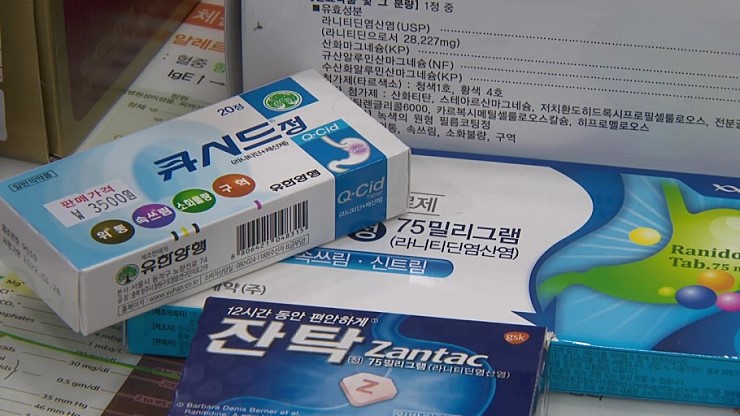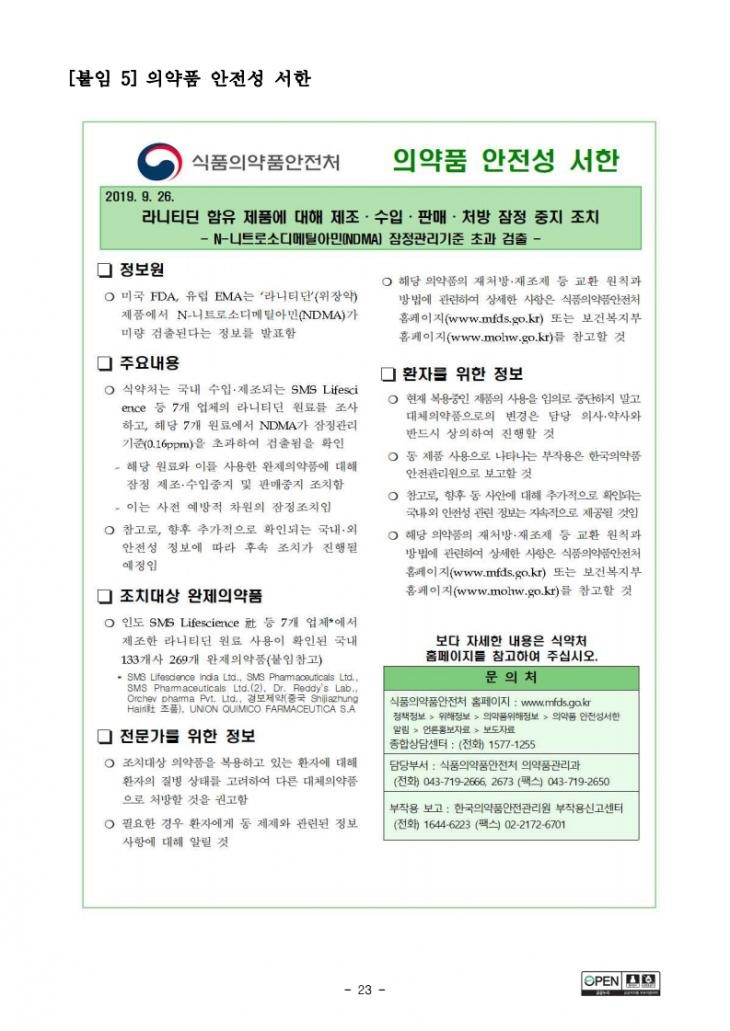U.S. Food and Drug Administration (FDA) and the European Medicines Agency (EMA) recently revealed that the cancer-causing substance N-nitrosodimethylamine (NDMA) was detected in some over the counter and prescription gastrointestinal medicine containing the medicinal ingredient Ranitidine. Trace amounts of NDMA, which at high exposure rates is a potential carcinogen, was detected in Glaxo Smith Klein's (GSK) popular prescription medication Zantac requiring stores and pharmacies at home and abroad to pull the items off their shelves.
 |
| ▲ A trace amount of NDMA was detected in the Zantac of GSK, causing an emergency for domestic and foreign medicines. (Photo from YTN) |
GSK is a global pharmaceutical company that focuses on research and development of new medicines, vaccines, etc. Zantac is a core product of theirs and is sold to address digestive issues. However, with the recent discovery of unhealthy levels of NDMA, the item has been removed from market. NDMA is an industrial chemical substance that is hepatotoxic and causes liver cancer when a person ingests it regularly. It has been classified by the WHO Cancer Institute as a type 2A substance, meaning it has been identified as a cancer-causing agent.
In 2018, NDMA was detected in the valsartan, a base material for a hypertension treatment made in Zhejiang, Huahai. In that instance, the EMA immediately suspended the sale of the product, as was done with Zantac.
In Korea, the Ministry of Food and Drug Safety (MFDS) and the Ministry of Health and Welfare also suspended the sale of all medicines containing Ranitidine the base ingredient in Zantac, because it was found to be the main source of NDMA contamination. As a result, the sale of 175 prescriptions based medicines and 94 over the counter medicines ceased.
Worldwide, health departments took immediate action on the matter. Health Canada announced the recall of 5 pharmaceutical products containing Ranitidine. In Canada, Ranitidine is available both over-the-counter and by prescription. Other health departments are conducting their own tests to assess for potential damage to human health. In all instances, regulators and other implicated pharmaceutical companies are voluntarily recalling their ranitidine based drugs which are currently on the market. Ranitidine is sold under store brand antacid medicines at Walgreens, Walmart and Rite Aid that were manufactured by Dr. Reddy’s Laboratories in the USA. Dr. Reddy’s Laboratories took part in the product suspension and distribution of ranitidine when high levels of NDMA were found in samples of the Ranitidine they produced. The company expects “to provide an update in the coming days,” said spokeswoman Lori McCreary. This decision was made after the US FDA's late detection of suspected cancer-causing agents. As a result of this growing ranitidine issue, international health regulators are concerned about the collection and prevention of drugs containing the carcinogenic substance in circulation. The Walgreens versions of recalled products were sold under the store brand name Wal-Zan. The Walmart and Rite Aid labeled versions were described purely as ranitidine tablets. Other pharmaceutical companies such as Sandoz also confirmed high level of NDMA in their Ranitidine based drugs. Sandoz Ranitidine Hydrochloride Capsules were distributed nationwide to wholesalers. But all its Ranitidine capsules, including 150mg and 300mg forms, were recalled by September 23. Sandoz notified its customers via mail and via the Sandoz web site.
To understand more about the impact and gravity of the situation, the Dankook Herald interviewed a representative from GSK. During the interview we learned that Saraca, the laboratory that provides the base material API (Active Pharmaceutical Ingredient) for Zantac, has been under notice to halt the validation of ranitidine from European Directorate For the Quality of Medicines & Healthcare, a subsidiary of the European Parliament that organizes international conferences, education and seminars on the creation of the European Convention since September 19. Based on this information, they decided to recall all products which were made from raw materials coming out of Saraca and Dr. Reddy’s Laboratories as a precaution. Because GSK thrives on bringing patients quality products every time, they think that it’s very unfortunate that patients and medical experts are being inconvenienced from this matter. GSK Korea voluntarily recalled all Zantac products made by Saraca and Dr. Reddy's Laboratories’ raw materials as a precautionary measure. They also mentioned that they are in discussion now with the Korea Pharmacy Association, companies and wholesale traders, for the best method to recall the products.
The USFDA is addressing each examination and request autonomously for products containing NDMA. Ned Sharpless, proxy director at the USFDA, announced that they examined each product immediately after the latent impurities were found and will soon be able to offer their results on how to deal with these hazardous substances shortly. Germany and Italy’s authorities also announced that they are examining relevant medicines and decided to recall the products until a firm resolution is found. Swiss authorities announced that while all the relevant medicines in fact contained NDMA, the levels were not high enough to seriously harm the heath or consumers. However, they too decided to withdraw all Ranitidine related products as a precaution. Egypt and the United Arab Emirates also withdrew their Ranitidine series of medicines and decided to prohibit future sales.
This year's detection of NDMA in Zantac impacts the safety of medicine. The Korean Medical Association said, "Foreign institutions must first recognize the threat of the substance and the belated investigation by the MFDS makes us question the reason for their existence," adding, "The biggest victims are doctors and patients." The MFDS should make extensive improvements and enhance their expertise in evaluating overall medication safety management in line with its duties of protecting the public and should exert more active efforts to manage safe drug production.
 |
| ▲ A medication safety letter for medicines, including Zantac, disclosed by the Ministry of Food and Drug Safety. (Data from Ministry of Food and Drug Safety) |
김민, 신지희, 전소영, 최윤서 dankookherald@gmail.com

![[Campus Magnifier] Let's Surf the Library!](/news/photo/202404/12496_1765_4143.jpg) [Campus Magnifier] Let's Surf the Library!
[Campus Magnifier] Let's Surf the Library!
![[Campus Magnifier] Let's Surf the Library!](/news/thumbnail/202404/12496_1765_4143_v150.jpg)





